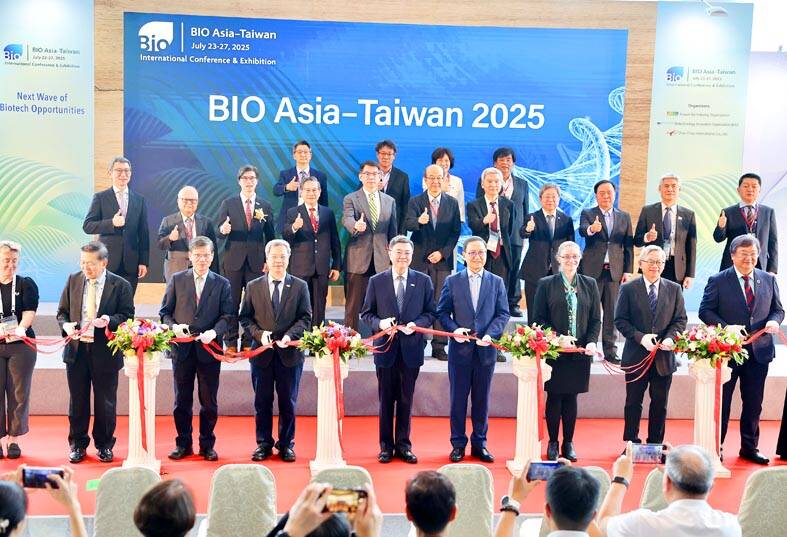The government will promote cross-disciplinary integration of chips and artificial intelligence (AI) to upgrade the biotech sector and enhance global competitiveness, positioning Taiwan as a trustworthy international partner, Premier Cho Jung-tai (卓榮泰) said yesterday at the opening of BIO Asia-Taiwan exhibition.
The event features more than 900 leading companies occupying 2,200 booths and participants from more than 50 countries, Cho said in his opening remarks.
It showcases Taiwan’s strengths in biotech and reflects the government’s strong commitment to building a friendly investment environment, he added.

Photo: CNA
Taiwan’s biotech sector has seen more than a decade of steady growth, with last year’s output surpassing NT$775 billion (US$26.4 billion), the highest ever, Cho said.
With 15 drugs approved for international sales and dozens of medical devices receiving foreign certifications annually, the industry is expanding, he said.
Biomedicine and agriculture were a focus of a report presented by the National Science and Technology Council at the Executive Yuan’s regular meeting yesterday, the premier said.
In biomedicine, seminconductors, AI and semiconductor technologies would be integrated — from upstream prototyping and midstream pilot production, to downstream regulatory easing and infrastructure deployment — to fully unleash the sector’s research and development and production potential, he said.
The premier touted Taiwan’s robust information and communications technology industry, outstanding healthcare system and comprehensive National Health Insurance database, giving it a strong foundation for industrial innovation.
The government will implement concrete policies to optimize the biotech ecosystem by enhancing funding access, regulatory clarity, talent development and market expansion to boost economic resilience and position Taiwan as a reliable and collaborative global partner, he said.
This year’s BIO Asia-Taiwan — Asia’s largest biotech event — is being held at the Taipei Nangang Exhibition Center through Sunday.

ELECTRONICS BOOST: A predicted surge in exports would likely be driven by ICT products, exports of which have soared 84.7 percent from a year earlier, DBS said DBS Bank Ltd (星展銀行) yesterday raised its GDP growth forecast for Taiwan this year to 4 percent from 3 percent, citing robust demand for artificial intelligence (AI)-related exports and accelerated shipment activity, which are expected to offset potential headwinds from US tariffs. “Our GDP growth forecast for 2025 is revised up to 4 percent from 3 percent to reflect front-loaded exports and strong AI demand,” Singapore-based DBS senior economist Ma Tieying (馬鐵英) said in an online briefing. Taiwan’s second-quarter performance beat expectations, with GDP growth likely surpassing 5 percent, driven by a 34.1 percent year-on-year increase in exports, Ma said, citing government

UNIFYING OPPOSITION: Numerous companies have registered complaints over the potential levies, bringing together rival automakers in voicing their reservations US President Donald Trump is readying plans for industry-specific tariffs to kick in alongside his country-by-country duties in two weeks, ramping up his push to reshape the US’ standing in the global trading system by penalizing purchases from abroad. Administration officials could release details of Trump’s planned 50 percent duty on copper in the days before they are set to take effect on Friday next week, a person familiar with the matter said. That is the same date Trump’s “reciprocal” levies on products from more than 100 nations are slated to begin. Trump on Tuesday said that he is likely to impose tariffs

HELPING HAND: Approving the sale of H20s could give China the edge it needs to capture market share and become the global standard, a US representative said The US President Donald Trump administration’s decision allowing Nvidia Corp to resume shipments of its H20 artificial intelligence (AI) chips to China risks bolstering Beijing’s military capabilities and expanding its capacity to compete with the US, the head of the US House Select Committee on Strategic Competition Between the United States and the Chinese Communist Party said. “The H20, which is a cost-effective and powerful AI inference chip, far surpasses China’s indigenous capability and would therefore provide a substantial increase to China’s AI development,” committee chairman John Moolenaar, a Michigan Republican, said on Friday in a letter to US Secretary of

Taiwan Semiconductor Manufacturing Co’s (TSMC, 台積電) market value closed above US$1 trillion for the first time in Taipei last week, with a raised sales forecast driven by robust artificial intelligence (AI) demand. TSMC saw its Taiwanese shares climb to a record high on Friday, a near 50 percent rise from an April low. That has made it the first Asian stock worth more than US$1 trillion, since PetroChina Co (中國石油天然氣) briefly reached the milestone in 2007. As investors turned calm after their aggressive buying on Friday, amid optimism over the chipmaker’s business outlook, TSMC lost 0.43 percent to close at NT$1,150